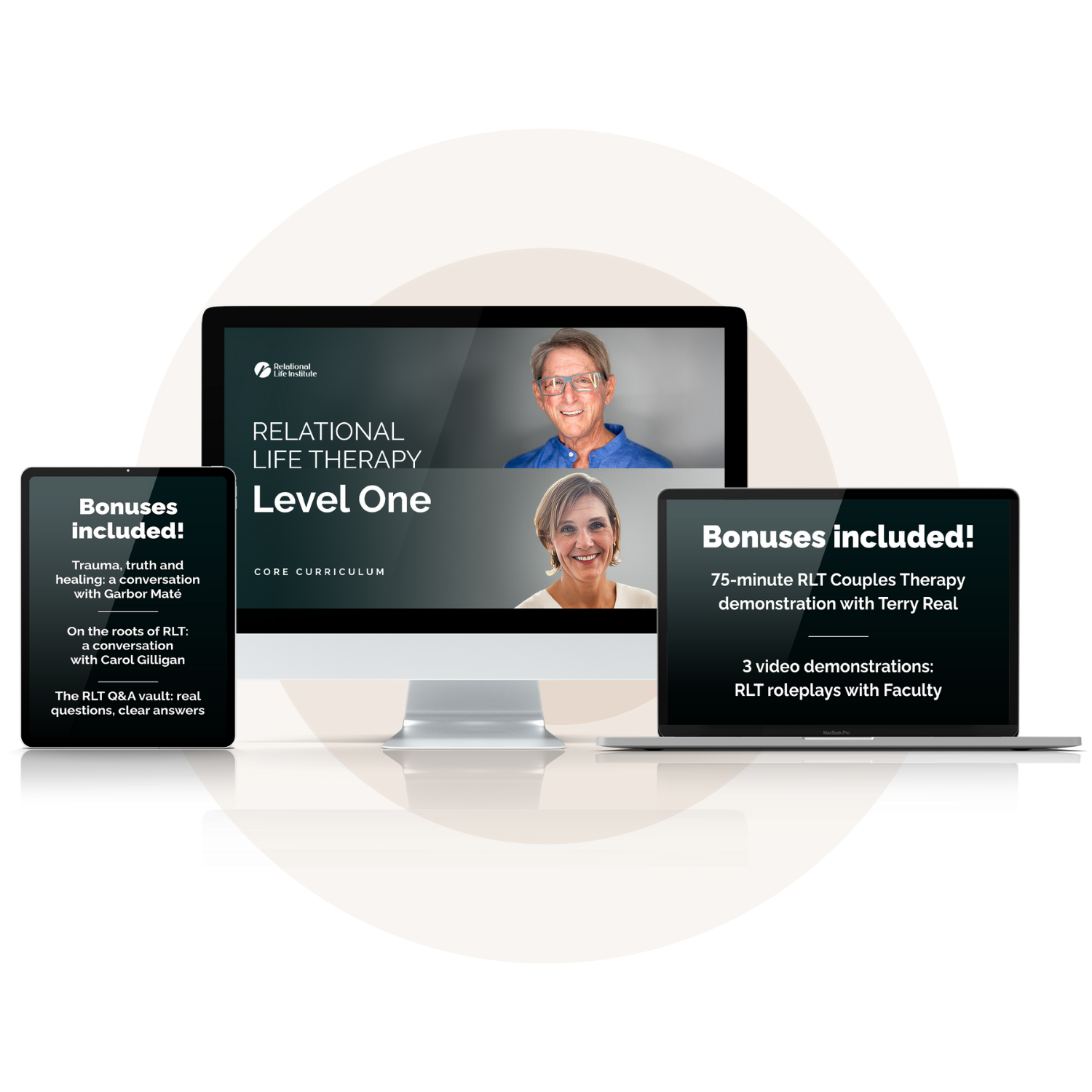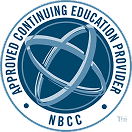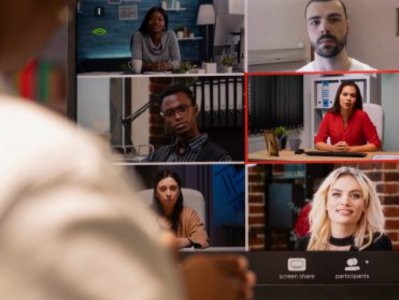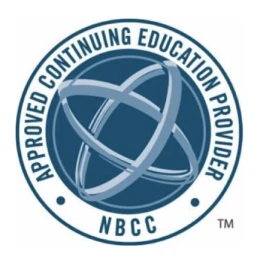
Get the step-by-step roadmap for understanding any relationship problem with the kind of precision that builds trust from the very first session. Enroll in RLT Level 1 and learn how to:

100% Money-Back Guarantee

10 Continuing Ed Credit Hours Included Upon successful completion of a short online assessment.More details here

Relational Life Institute (RLI) has been approved by NBCC as an Approved Continuing Education Provider, ACEP No. 7495. Programs that do not qualify for NBCC credit are clearly identified. Relational Life Institute (RLI) is solely responsible for all aspects of the programs.

International Coaching Federation (ICF) has approved this program for 7 Core Competency hours and 3 Resource Development hours. (Please note: Resource Development includes training formerly called Personal Development, Business Development, or Other Skills and Tools).

Every effective intervention begins with one thing:
When you have that clarity, you can confidently keep even the most volatile couples moving forward. Without it, you risk spending your time:
In sessions filled with blame or shutdown, finding the truth beneath the layers of pain and resentment is anything but straightforward.



That’s what Terry Real has done for more than 40 years – not by waiting for insight to arise, but by utilizing 8 diagnostic lenses that make the core of relationship problems unmistakably clear.
You’ll learn how to use those exact lenses in RLT Level 1 to give you confidence, clarity, and a way to help clients see – often for the first time – how they’re co-creating the disconnection.

A clear, structured approach to the most complex work you’ll ever do.

Lead with clarity
So you walk into sessions knowing exactly what to track.
Diagnose with precision
See what’s really driving the dysfunction.
Guide the process
Keep even volatile couples moving forward.
Stay grounded
So you leave sessions energized instead of depleted.
Work with reactivity
Address power, shame, and disconnection head-on.
Speak hard truths
Confront skillfully while staying connected.
Your training includes recorded teaching, footage of real RLT couples therapy, and role plays of challenging couples dynamics to help you build fluency and apply the method confidently in practice.
Whether you’re looking to go deeper in your couples work, or want a diagnostic map you can rely on when sessions go off track, RLT Level 1 offers a clear, practical foundation to guide your approach.
And with on-demand access, you can work through the modules at your own pace.
You’ll get instant access to all five modules and special bonuses, so you can start learning right away and integrate the material into your practice on a timeline that works for you.
Built on 40 years of clinical expertise, Relational Life Therapy draws from decades of real-world practice, research, and proven results.
This opening module reframes the entire approach to couples therapy by introducing the three foundational phases of RLT and how they work together to generate transformation.
You’ll learn:
Module 2 introduces the first three diagnostic lenses, helping you get beneath the presenting problem and help clients move beyond individual empowerment into relational empowerment.
You’ll learn:
Go deeper into the heart of the couple’s dysfunction by decoding their reactive strategies and early conditioning. Explore the Adaptive Child and Losing Strategies, giving you a structured way to name each partner’s reactivity without shame or blame.
You’ll learn:
This module takes you deeper into the structural forces shaping clients’ behavior. You’ll learn how to use the Relationship Grid to assess self-esteem and boundaries, and how early family roles continue to shape how each partner shows up in their relationships.
You’ll learn:
Explore the last two diagnostic lenses – Blatant/Latent Power and Social Context.
You’ll learn how to use this full map to gather leverage, confront destructive behaviors, and “wake up” even the most resistant clients.
You’ll learn:

The fastest way to internalize the eight diagnostic lenses is to see them in action.
Observe Terry conduct a real Phase 1 intervention with a couple, showing how he gathers data, reads the system, and begins to name the dynamic. This demonstration bridges the gap between theory and practice so you can better translate the model into your own sessions.

In these clip-length demonstrations, experienced RLT faculty role-play common couples dynamics and show how a practitioner can navigate them using Phase 1 data-gathering tools. You’ll see the subtle moves, from tracking interaction patterns to asking the right questions, that help reveal the deeper structure beneath the surface conflict.

In this 60-minute interview, Terry sits down with Dr. Gabor Maté for an intimate dialogue on the relationship between trauma, emotional repression, and relational repair. Together they explore the physical and relational toll of unresolved trauma and how both therapists and clients can begin to heal.

Go behind the scenes of RLT’s origin story in this rare discussion between Terry and world-renowned feminist psychologist Carol Gilligan.
From the influence of relational ethics to the evolving role of gender in therapy, this conversation offers deeper insight into the intellectual foundations that shaped RLT and why it remains a timely, radical approach to working with couples.

This curated video collection features some of the most insightful questions from past RLT Level 1 cohorts covering everything from what to do if a couple’s stories don’t match to working with resentful clients who don’t want to change.

There are certain things that are right and wrong, and we’ve got to call them out… [RLT] It gave me permission to do therapy the way I always believed it should be done… If you want to work with couples with integrity, this is the modality you should learn.”
Dr. Gloria Lee, Psychologist, PsyD, RPsych
Burnaby, BC

Even in difficult cases like infidelity, I was able to handle so much more effectively because of RLT… It’s a very effective way to be with a client.”
Nasim Mughal
Licensed Psychotherapist
Karachi, Pakistan

When I think about how I used to approach my work with couples and how I approach my work now… I didn’t know what I was doing, but I didn’t know I didn’t know. Now, I have this clarity and knowledge about what it is that I can deliver to them that’s going to be helpful.”
Brenda Forster
Clinical Counsellor, M.Ed., R.C.C.
Kelowna, BC

For most of my couples, their course of therapy is between six months to two years. Whereas before some couples I would be seeing for like up to five years and still not really feeling like the strong tangible results were there.”
Rachel Keller
Clinical Social Worker, LCSW-C, CST
Baltimore, MD

I’ve done all kinds of trainings over the years but never found a model that truly fit for me. I had become “eclectic” in my approach, never really mastering any one approach. I longed for a model that encouraged me to myself—open, authentic, and most importantly, effective. I found my home in RLT.”
Sig Taylor
MSW, RSW, RMFT
Calgary, Alberta, Canada
At the heart of RLT Level 1 is a structured approach to what we call waking up the client – helping them recognize the real role they play in their relational dynamic. To do that effectively, you’ll learn to assess each couple through 8 specific diagnostic lenses that bring clarity to even the most complex relationships.
When you have that clarity, you can confidently keep even the most volatile couples moving forward. Without it, you risk spending your time:
Screen for issues that must be addressed before relational work can begin. This includes factors like active addiction, psychiatric instability, or ongoing abuse.
Identify each partner’s relational stance and the repetitive loop they co-create. This lens reveals the dynamic that keeps them stuck.
Spot the five automatic behaviors that derail intimacy. These include being right, controlling, unbridled self-expression, retaliation, and withdrawal.
Map each partner’s relational posture by assessing their self-esteem and boundaries – particularly how grandiosity or shame shows up in the dynamic.
Explore which childhood survival role each partner adopted, such as the hero, scapegoat, or lost child, and how that role influences their adult relationships.
Assess how power is expressed in the relationship. Latent partners tend to be indirect or passive, while blatant partners are more overt, dominant, or grandiose.
Account for broader cultural factors like gender, race, class, and privilege. This lens helps you recognize how social identity shapes power, expectation, and behavior in the relationship.
Together, these lenses give you a clear, multidimensional understanding of each partner and the dynamic between them, so you can lead the work with structure and confidence.

Terry Real, LICSW, is an internationally recognized family therapist and bestselling author.
Known as “the turnaround guy,” Terry is famous for his remarkable ability to save couples on the brink of divorce. He has trained thousands of therapists in his RLT model to help them achieve similar results.

Our senior RLT faculty play an integral role in training the next generation of therapists. Each brings a deep understanding of the RLT model and their own clinical experience, demonstrating how this powerful framework can be adapted to practitioners’ own therapeutic styles.
Learn with our faculty in RLT Level 1 as they guide you through clinical role plays and answer commonly asked questions inside the Q&A Vault.
Your satisfaction guarantee for this January 22 cohort
When you join, you’ll get full access to all 5 on-demand modules with Terry Real, plus bonus resources – risk-free.
We’re confident you’ll love RLT Level 1, but we offer a 100% money-back guarantee for your peace of mind.
If, for whatever reason you’re not completely satisfied, just email us within 14 days of your purchase and we’ll refund you in full. No questions asked.




RLT Level 1 is the first step of the full certification pathway. If you choose to continue later,
your full Level 1 tuition will be credited toward the certification.

Yes. RLT Level 1 Homestudy offers 10 NBCC-approved Continuing Education (CE) credits upon successful completion of a short online assessment.
Please ensure you click “Complete” on the final class. Once you do, the assessment will appear automatically in your menu.
The Relational Life Institute (RLI) has been approved by NBCC as an Approved Continuing Education Provider, ACEP No. 7495.
Please note: While NBCC CEs are widely accepted by many state licensing boards, it’s your responsibility to confirm eligibility with your specific board or credentialing body.
No. Terry’s core training is pre-recorded but will broadcast live each week so you can experience his work together.
This will be immediately followed up with a live deep-dive session led by Bonny Slim, a senior RLT faculty member with more than 10 years of experience in the model.
These calls are designed to help you integrate the material and apply the 8 diagnostic lenses with more clarity and confidence.
Yes. This specific January 2026 cohort of RLT Level 1 offers 10 Continuing Education (CE) credits upon completion of the training for therapists (NBCC) and coaches (ICF).
To be eligible, you must attend all five trainings sessions in full (2 hours each). CE credit cannot be awarded for watching recordings.
Registration will be confirmed via Zoom records so make sure you join the classes with the email address you used to enroll.
Please note: It’s your responsibility to confirm eligibility with your specific board or credentialing body.
The Relational Life Institute (RLI) has been approved by NBCC as an Approved Continuing Education Provider, ACEP No. 7495.
International Coaching Federation (ICF) has approved this program for 7 Core Competency hours and 3 Resource Development hours.
Yes. RLT Level 1 is designed for both therapists and coaches. In fact, many coaches already use RLT’s principles to deepen their client work. If you support people in relational growth, then this training will serve you well.
Absolutely. While RLT is rooted in couples work, the diagnostic tools and confrontational techniques are just as powerful in individual therapy, especially with clients working through relational trauma, boundary issues, or recurring patterns in relationships. You’ll walk away with new language, sharper insights, and strategies you can use immediately – even one-on-one.
Yes. Terry built RLT as a direct response to the limitations of traditional couples therapy. He’s often known as the “last resort” therapist, called in when nothing else has worked. This method was designed for the toughest cases: high-conflict couples, chronic resentment, emotional shutdown, infidelity, even situations on the brink of divorce.
We’re confident you’ll love RLT Level 1, but we offer a 100% money-back guarantee for your peace of mind. If, for whatever reason you’re not completely satisfied, please contact us at support@terryreal.com within 14 days of your purchase and we’ll issue you a full refund, no questions asked.
You don’t have to, but we recommend it. The best way to build fluency with the RLT model is to start experimenting with the tools in session. Even applying one lens at a time can create powerful shifts. You’ll be surprised how quickly it clicks.
Not at first, and that’s okay. Terry may be able to identify root issues in a single session, but he invented the method and has 40+ years of experience.
As a new practitioner, you’re encouraged to take your time. RLT teaches you how to layer 8 diagnostic lenses over time, building a rich, nuanced picture of what’s really going on beneath the surface.
Level 1 is a complete and self-contained training. Many graduates have made immediate improvements in their client outcomes after completing just this course.
That said, RLT is a deep and evolving model, and if you choose to go further, Level 2 and full certification are always available to you.

We’re confident you’ll love RLT Level 1, but we offer a 100% money-back guarantee for your peace of mind. If, for whatever reason you’re not completely satisfied, please contact us at support@terryreal.com within 14 days of your purchase and we’ll issue you a full refund, no questions asked.



FORMAT:
Continuing Education credits offered:
Requirements for CE Certificate:
The Relational Life Therapy Level 1 Training
Homestudy Course Continuing Ed Details
Facilitated by Terry Real, LICSW
This home study course is approved for continuing education hours as described below.
NBCC (National Board of Certified Counsellors)
10 CE hours for Beginner Mental Health Professionals
Relational Life Institute (RLI) has been approved by NBCC as an Approved Continuing Education Provider, ACEP No. 7495. Programs that do not qualify for NBCC credit are clearly identified. Relational Life Institute (RLI) is solely responsible for all aspects of the programs.

ACEP No. 7495
Target Audience
Social Workers, MFTs, Counselors, Substance Abuse Counselors, Nurses, and LMHCs, LMFTs, Educators, Coaches, Chemical Dependency Counselors
Course Content Level
The course content is appropriate for beginner level clinicians.
Course Description
Terry Real presents RLI’s introductory training course, Relational Life Therapy Level 1.
Over five recorded classes you’ll be introduced to the powerful principals behind Relational Life Therapy (RLT) as taught by Terry Real. RLT Level 1 is designed to give you an in-depth introduction to the theory and practice of the RLT model.
During this course, students will discover the differences between RLT and traditional psychodynamic therapy. Also considered are the stances of “one-down shame” and “one-up grandiosity” in couples; according to RLT, true intimacy can only happen when partners are “same-as” with each other. RLT is about action and lasting results, helping people to make major changes to the negative parts of their character, and the critical role and stance of the therapist is described. Presented also are the concepts of Relational Mindfulness, Joining Through The Truth, and psychological patriarchy.
RLT Level 1 is the first step toward RLT certification and will prepare you for the Level 2 & 3 trainings to deepen your understanding of Relational Life Therapy.
Learning Objectives: At the completion of this course, participants can expect to:
Throughout the course, you’ll gain deeper competency in and be able to:
Continuing Ed Credits Available: 7.5 NBCC credit hours ($40 additional fee)
CE Certificate Requirements:
It is the participant’s responsibility to check if their Board, state, organization is approved for these Continuing Ed credit hours. There is no partial credit. No refunds will be given on CE purchases for failure to check state approval.
Cost
This course is $397.00 for a single payment or three payments of $137.00
Commercial Support Disclaimer
There is no conflict of interest for this program.
Cancellation Policy
You may request a refund up to 2 days after purchase.
Please contact support@terryreal.com if you wish to cancel your purchase.
Accommodations
If you need special accommodations or have questions, please contact us at support@terryreal.com
Instructor’s Bios:
Terry Real, LICSW: Terry Real is the bestselling author of I Don’t Want to Talk About It: Overcoming the Secret Legacy of Male Depression, the straight-talking How Can I Get Through to You? Reconnecting Men and Women, The New Rules of Marriage: What You Need to Make Love Work and most recently Us: Getting Past You & Me to Build a More Loving Relationship just debuted in June 2022. Terry founded the Relational Life Institute, offering workshops for couples, individuals, and parents as well as a professional training program for clinicians. Terry’s work, with its rigorous commonsense approach, speaks to both men and women. A proponent of “full-throttle marriage,” Terry has been called “the most innovative voice in thinking about and treating men and their relationships in the world today.”
Julie Rudiger, LCSW has been a Licensed Clinical Social Worker for the last 30 years. In 2002, Julie opened her private practice, where she has helped hundreds of individuals and couples over the last two decades. Her professional journey took a transformative turn in 2008 when she began training with Terry Real, the founder of Relational Life Therapy (RLT). Julie has since used RLT to guide clients in discovering self-esteem, healing early wounds, and fostering deeper, more authentic relationships. A faculty member at the Relational Life Institute since 2022, Julie now trains other therapists and leads community workshops, including Men’s Groups and Relationship Skills Bootcamps. Additionally, she is trained in EMDR, ACT, DBT, Gestalt, and the Enneagram.
Desirae Ysasi, LPC-S is a Licensed Professional Counselor – Supervisor with nearly two decades of experience, specializing in relationship counseling. Serving the San Antonio community since 2006, she works exclusively with couples in romantic relationships, folks in non-traditional romantic relationship structures (ethical nonmonogamy), and adults seeking to improve family dynamics. Desirae became a Certified Relational Life Therapist in 2018 trained directly by Terry Real, the founder of Relational Life Therapy (RLT). She joined the faculty of the Relational Life Institute in 2022 and now serves as Director of Training & Certification, overseeing the global certification program. She has been the owner of Ysasi Counseling since 2014 and in the fall of 2024, Desirae opened Relational Life Texas, a virtual therapy group practice focused on RLT, providing relationship therapy across Texas.
Kate Harris, Ph.D.: Licensed Clinical Psychologist
Kate is a Clinical Psychologist and a certified Martha Beck, North Star Coach. In 2015, Kate watched Terry Real work live with 5 couples and was instantly committed to becoming an RLT therapist. Kate believes that RLT honors “the worth and dignity of all people” and it aligns clearly with her own personal values. After attending a Relationship Bootcamp workshop, she and her husband learned first-hand the tools Terry teaches and they continue to use them today to deepen their 32-year relationship. Kate became RLT Certified in 2018 and is a valued teacher.
Anna Sterk, LMFT
Anna began training in RLT with Terry Real in 2012 and has been providing therapy, Essential Skills Bootcamps, consultation, and supervision through the RLT model for years; Anna was thrilled to have the opportunity to teach and train practitioners as faculty with the Relational Life Institute (RLI) beginning in 2022. Anna’s style as a therapist, teacher, and supervisor is to balance compassion and collaboration with direct feedback. Anna’s roots are in systems theory and cultural studies, which was a natural fit for the RLT model, and supports her goal of teaching the skills to navigate long term relationships and support relational living for both clients and students alike. As RLI Faculty, Anna teaches the Practicum courses and Small Group Mentoring for RLT certification students, along with special topic courses.
BONUS Material Instructors (CE hours not included in bonus content)
Dr. Gabor Maté is a physician who specialized in family practice, palliative care, and addiction medicine. A renowned speaker, physician, and bestselling author, Dr. Gabor Maté is highly sought after for his expertise on a range of topics including addiction, childhood trauma, stress, and mind/body connection. He is called a “people whisperer” for his gift of seeing deep inside anyone. His life’s work is dedicated to liberating people from their childhood trauma so that they can make a choice of how to live in the present moment.
Carol Gilligan, Ph.D., of New York, NY has been recognized by many institutions and organizations for her efforts in the area of women’s advancement and moral psychology. She studied literature at Swarthmore College as an undergrad, and she graduated from Radcliffe in 1960 with a master’s in psychology. She continued to Harvard, where she received her Ph.D. in psychology in 1964. Three years later, Gilligan took a teaching position at Harvard where she worked alongside Erik Erikson and Lawrence Kohlberg. While Gilligan worked as a research assistant along Kohlberg, known for his theory of moral development, she began focusing on the moral dilemmas and development of young girls. In addition to the Grawemeyer Award for Education, Gilligan has also received the Heinz Award for Human Condition and was named one of the most influential people of the year by TIME Magazine in 1996. She has also published works of fiction and developed a full-length play based on Nathaniel Hawthorne’s Scarlet Letter.
Please Note: Licensing Boards change regulations often and while we attempt to stay abreast of their most recent changes, if you have questions or concerns about this course meeting your specific board’s approval, we recommend you contact your board directly to obtain a ruling.
Contact information: ACEP Administrator & Operations Director for Relational Life Institute (RLI), Lisa Sullivan follows: 291 Nahanton Street, Newton, MA 02459; 617-861-3030 lisa@relationallife.com; www.relationallife.com
AWAITING Conference CE REQUIREMNTS
The Relational Life Institute is pleased to offer:
An Introduction to Relational Life Therapy
Relational Life Institute (RLI) has been approved by NBCC as an Approved Continuing Education Provider, ACEP No. 7495. Programs that do not qualify for NBCC credit are clearly identified. Relational Life Institute (RLI) is solely responsible for all aspects of the programs.

ACEP No. 7495
Format: A one-day LIVE training facilitated by Desirae Ysasi, LPC-S, RLI Director of Faculty
Location: Regent’s University London, Inner Cir, London NW1 4NS, United Kingdom
Continuing Education credits offered: 5.5 credit hours.
At the completion of this course, all participants will be invited by email to purchase the 5.5 CE credits for a $40 fee. To receive a certificate, you must attend the full course. There is no partial credit, attendance will be taken.
Content: If you’re new to the Relational Life Therapy (RLT) model – or just want to revisit the foundations ahead of your training with 2-Day Training with Terry Real. Join RLI’s Director of Training Desirae Ysasi for a pre-workshop training the day before Terry Real’s course begin.
You’ll explore the theory behind RLT, along with some of the effective tools and strategies that move couples toward meaningful change.
Learning Objectives: At the completion of this course, participants can expect to:
Target Audience: Social Workers, MFTs, Counselors, Substance Abuse Counselors, Nurses, and LMHCs, LMFT’s, Educators, Coaches, Chemical Dependency Counselors
Course Content Level: The course content is appropriate for Beginner level clinicians.
Cost:
Oct 27th one-day training with Desirae ONLY: £170 early bird until July 1 (then £195)
Oct 28-29th two-day training with Terry ONLY: £375 early bird until July 1 (then £425)
BOTH events (3 full days of training): £545 early bird until July 1 (then £620)
Course Dates & Hours: Monday, October 27, 2025, from 9am to 4pm
TO REGISTER: Please visit: https://relationallife.com/london-2025-trainings
Cancellation Policy:
We know sometimes plans can change so you’re protected by a 100% money-back guarantee until September 26, 2025. Please contact us at support@terryreal.com before September 26, 2025, and we will refund you. Any cancellations after this date will not be eligible for refunds.
If you need special accommodations or have questions, please contact us at support@terryreal.com
Please contact our Support team if you have any questions support@terryreal.com
Instructor’s Bio:
Desirae Ysasi, LPC-S is a Licensed Professional Counselor – Supervisor with nearly two decades of experience, specializing in relationship counseling. Serving the San Antonio community since 2006, she works exclusively with couples in romantic relationships, folks in non-traditional romantic relationship structures (ethical nonmonogamy), and adults seeking to improve family dynamics. Desirae became a Certified Relational Life Therapist in 2018 trained directly by Terry Real, the founder of Relational Life Therapy (RLT). She joined the faculty of the Relational Life Institute in 2022 and now serves as Director of Training & Certification, overseeing the global certification program. She has been the owner of Ysasi Counseling since 2014 and in the fall of 2024, Desirae opened Relational Life Texas, a virtual therapy group practice focused on RLT, providing relationship therapy across Texas.
CONFLICT of Interest: There is no known conflict of interest or commercial support for this event.
Grievance Procedure:
If a student believes they have been discriminated against, they can submit a written complaint that includes their name, address, phone number, location, date, and a detailed description of the issue. If a student with a disability disagrees with the accommodation provided or has any other grievances, they can schedule a meeting to discuss and attempt to find a solution together. If the student is still not satisfied with the accommodation after further discussion, they can contact the Operations Director for
the Relational Life Institute (RLI), Lisa Sullivan, via phone, email, or mail. If the grievance cannot be resolved, the complainant will be advised to contact the appropriate Ethics Committee or Licensing Board. The Operations Director will keep all grievances and their resolutions confidential in locked files.
A copy of this Grievance Procedure is available upon request.
Contact information: ACEP Administrator & Operations Director for Relational Life Institute (RLI), Lisa Sullivan follows: 291 Nahanton Street, Newton, MA 02459; 617-861-3030 lisa@relationallife.com
The Relational Life Institute is pleased to offer:
The RLT Level 1 Training Course
Relational Life Institute (RLI) has been approved by NBCC as an Approved Continuing Education Provider, ACEP No. 7495. Programs that do not qualify for NBCC credit are clearly identified. Relational Life Institute (RLI) is solely responsible for all aspects of the programs.

ACEP No. 7495
FORMAT: Five LIVE Online Sessions on Zoom, facilitated by Bonny Slim, LMFT and Terry Real, LICSW
Continuing Education credits offered: 10 credit hours for 5 Classes. Full attendance required.
Requirements for CE Certificate: At the end of this course, you’ll receive an email inviting you to request your Continuing Education certificate.
The certificate is free of charge. To qualify, you must:
Course Content:
Over five live classes you’ll be introduced to the powerful principals behind Relational Life Therapy (RLT). RLT Level 1 is designed to give you an in-depth introduction to the theory and practice of the RLT model.
Discover the differences between RLT and traditional psychodynamic therapy. Also considered are the stances of “one-down shame” and “one-up grandiosity” in couples; according to RLT, true intimacy can only happen when partners are “same-as” with each other. RLT is about action and swift results, helping people to make major changes to the negative parts of their character, and the critical role and stance of the therapist is described. Presented also are the concepts of Relational Mindfulness, Joining Through the Truth, and psychological patriarchy.
RLT Level 1 is the first step toward RLT certification and will prepare you for the Level 2 & 3 trainings.
Learning Objectives: At the completion of this course, participants can expect to:
Throughout the course, you’ll gain deeper competency in and be able to:
Target Audience: Social Workers, MFTs, Counselors, Substance Abuse Counselors, Nurses, and LMHCs, LMFT’s, Educators, Coaches, Chemical Dependency Counselors
Course Content Level: The course content is appropriate for Beginner level clinicians.
Cost: $395 in full; or 3 payments of $137 each
Course Dates & Hours:
Each class will meet from 12pm to 2pm Eastern Time on these dates:
Session 1 – January 22, 2026
Session 2 – January 29, 2026
Session 3 – February 5, 2026
Session 4 – February 12, 2026
Session 5 – February 19, 2026
TO REGISTER: Please visit this site for registration:
https://relationallife.com/level-1-training
Cancellation Policy: You may request a refund up to 2 days after the first live session.
Please contact support@terryreal.com if you wish to cancel your purchase.
If you need special accommodations or have questions, please contact us at support@terryreal.com
Please contact our Support team if you have any questions support@terryreal.com
Instructors’ Bios:
Terry Real, LICSW: Terry Real is the bestselling author of I Don’t Want to Talk About It: Overcoming the Secret Legacy of Male Depression, the straight-talking How Can I Get Through to You? Reconnecting Men and Women, The New Rules of Marriage: What You Need to Make Love Work and most recently Us: Getting Past You & Me to Build a More Loving Relationship just debuted in June 2022. Terry founded the Relational Life Institute, offering workshops for couples, individuals, and parents as well as a professional training program for clinicians. Terry’s work, with its rigorous commonsense approach, speaks to both men and women. A proponent of “full-throttle marriage,” Terry has been called “the most innovative voice in thinking about and treating men and their relationships in the world today.”
Bonny Slim, LMFT: Bonny started training in RLT in 2012 and has participated in most of the courses that Terry has offered since then. Through co-facilitating several Relational Bootcamps, she discovered how transformative the group experience can be. Bonny teaches several Practicum Trainings each year and anticipates the impact that the practicum groups have for participants will be enormously valuable. Her favorite aspect of RLT is the awareness that practicing relational skills in our own lives is essential to be able to authentically share/teach these skills to others.
CONFLICT of Interest: There is no known conflict of interest or commercial support for this event.
Grievance Procedure:
If a student believes they have been discriminated against, they can submit a written complaint that includes their name, address, phone number, location, date, and a detailed description of the issue. If a student with a disability disagrees with the accommodation provided or has any other grievances, they can schedule a meeting to discuss and attempt to find a solution together. If the student is still not satisfied with the accommodation after further discussion, they can contact the Operations Director for
the Relational Life Institute (RLI), Lisa Sullivan, via phone, email, or mail. If the grievance cannot be resolved, the complainant will be advised to contact the appropriate Ethics Committee or Licensing Board. The Operations Director will keep all grievances and their resolutions confidential in locked files.
A copy of this Grievance Procedure is available upon request.
Contact information: ACEP Administrator & Operations Director for Relational Life Institute (RLI), Lisa Sullivan follows: 291 Nahanton Street, Newton, MA 02459; 617-861-3030 lisa@relationallife.com
You’ve joined the Relational Life community. Expect thoughtful insights on building deeper, more authentic connections.